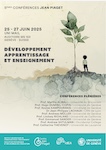Call for papersThese 5th Jean Piaget Conferences are intended for both researchers and doctoral students, as well as professionals (psychologists, ergonomists, doctors, educators, teachers, etc.) working in the fields of developmental psychology and education. This edition’s theme addresses crucial issues for the future of our societies, particularly regarding pedagogy, psychology's development, and knowledge transmission. As researchers, practitioners, or teachers, we are especially attuned to the challenges and opportunities associated with child and adolescent development, the improvement of educational practices, and the creation of learning methods tailored to current needs. A particular focus will be given to the field of analogy. Indeed, some invited speakers will explore the theme “Learning and Teaching with Analogies,” examining how analogy fosters the acquisition of new knowledge. As numerous studies have shown, analogy enables learners to connect what is already known with new information, thereby facilitating the understanding of abstract concepts through concrete examples. On one hand, learners spontaneously use analogy. They often draw connections between school concepts and prior knowledge, typically acquired through everyday experiences and without explicit instruction. However, while this prior knowledge is essential for learning, it can also be limiting. On the other hand, teachers can deliberately employ analogy in educational settings to facilitate learning. Diverse activities based on analogical reasoning principles thus provide pedagogical tools that make new concepts accessible and help address potential limitations posed by prior knowledge. We therefore find it relevant for researchers and practitioners to engage with these topics. This conference, focused on various aspects of developmental psychology, education, and training, will allow an in-depth exploration of several key facets of the educational process, including skill development, student learning, and addressing current educational and didactic challenges, while opening up innovative perspectives in teaching and learning. – Axis 1: Development. – Axis 2: Learning. – Axis 3: Teaching.
These three axes can be explored by considering the influence that various environments (family, school, digital, etc.) have on the development and learning of children, adolescents, and adults. In each of these themes, presentations will provide scientific insights into different areas of development, both typical and atypical, in light of the raised issues. Oral presentations, posters, or symposiums on the following topics may also be submitted (non-exhaustive list): - History of developmental psychology - Gender and learning - Neurodevelopmental disorders - Working memory - Emotions and learning - Early childhood - Piaget today - Analogy - Mathematics - Early skills
Symposia – 3 to 4 oral presentations per symposium – total symposium duration: 1h30: Note: Out of the 4 presentations, there must be at least 2 presenters from different laboratories.
Oral presentation sessions – 4 oral presentations per session – total session duration: 1h30 Duration of each presentation: 15 minutes, with 5 minutes for questions.
Poster Format: - Standard size A0 (dimensions 118.9 x 84.1 cm) - Horizontal orientation
Submissions open from December 17, 2024. |


